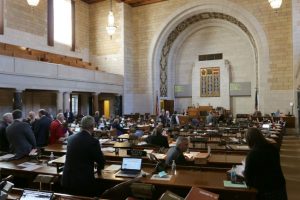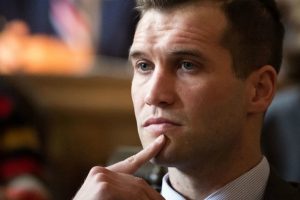 This Monday, Nebraska Legislature’s General Affairs Committee took testimony on two bills aimed at reducing property tax bills by using gambling proceeds. Nebraska municipalities, spearheaded by the City of Omaha opposed a measure that would use gambling expansion to lower the property taxes. Opponents that took an anti-gambling stance on the matter explained that the social costs associated with gambling outweigh the economic benefits and the state should reconsider its decision.
This Monday, Nebraska Legislature’s General Affairs Committee took testimony on two bills aimed at reducing property tax bills by using gambling proceeds. Nebraska municipalities, spearheaded by the City of Omaha opposed a measure that would use gambling expansion to lower the property taxes. Opponents that took an anti-gambling stance on the matter explained that the social costs associated with gambling outweigh the economic benefits and the state should reconsider its decision.
Officials from Nebraska’s municipalities also opposed a proposal that would pump about $5 million from keno proceeds into the state property tax credit fund. Ben Gray, President of the Omaha City Council explained that Legislative Bill 1102 would deprive Omaha local government of $1.4 million in keno profits every year.
He elaborated that the city currently uses keno funds to support various social programs and Henry Doorly Zoo & Aquarium. State Sen. Merv Riepe of Ralston also shared Gray’s stance on the matter, announcing that the city uses keno funds to pay off for the Ralston Arena. State Sen. Curt Friesen of Henderson explained that he suggested the keno changes in order to support lawmakers’ attempts to ease Nebraskan’s property taxes.
Gambling Expansion is a Long Shot in Nebraska
 The expansion of gambling industry worldwide is intertwined with the growing need of an additional source of revenue. In that way, lawmakers are able to plug some holes in the budget, without cutting government spendings or increasing tax rates. Being economically viable and feasible solution, many states across the U.S. regulated their gambling market.
The expansion of gambling industry worldwide is intertwined with the growing need of an additional source of revenue. In that way, lawmakers are able to plug some holes in the budget, without cutting government spendings or increasing tax rates. Being economically viable and feasible solution, many states across the U.S. regulated their gambling market.
For quite some time, Senator Tyson Larson pushes to legalize poker, blackjack, slots, and other games of chance in order to provide property tax relief. Larson commented that 90% of the Nebraskans live close to a casino and the state’s strict regulations on the provision of gambling games will not stop players to gamble. According to rough estimations, the state could generate $300 to 400 million a year from gambling proceeds. Larson even introduced an amendment to the Nebraska state constitution to allow gambling.
Thus far, Larson’s efforts to legalize gambling hit a snag under the strong pressure coming from gambling opponents. During a recent committee hearing on tax relief, no one testified on behalf of a proposed constitutional amendment to allow expanded gambling. In fact, Larson, who represents the O’Neill area also remained silent on behalf of his own proposal. Opponents explained that gambling expansion is not the right way to raise revenue and the risk of exacerbating gambling-related problems is not worth it.
Sen. Lydia Brasch of Bancroft stated that the farmers and ranchers are looking for a property tax relief due to agriculture’s hard times. She added that even if the farmers welcome the idea of gambling expansion, senators do not seem to be really enthusiastic on the matter.



















